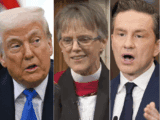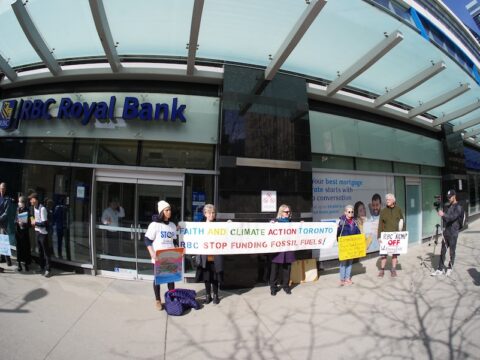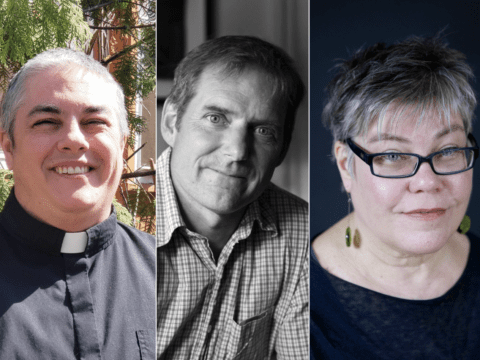American author and lecturer Phyllis Tickle has written more than two-dozen books on religion and spirituality and is a leading voice on the emerging church movement. She spoke to Karen Hilfman Millson in Toronto
KHM: In your book The Great Emergence: How Christianity Is Changing and Why, you talk about how every 500 years we go through a time of great upheaval when everything changes — intellectually, politically, culturally, sociologically, economically — and that we are in one of those times right now.
You may unsubscribe from any of our newsletters at any time.
Phyllis Tickle: Yes. Five hundred years ago we called it the Great Reformation, a thousand years ago it was the Great Schism, 1,500 years ago it was the Great Decline and Fall, and 2,000 years ago it was the Great Transition.
Today, what we are experiencing has been called the Great Emergence. As in every transition before it, there has been such an abrupt interruption in the way things are that there’s no going back.
KHM: In times like these, the church has been compelled to have what Bishop Mark Dyer has described as a huge “rummage sale,” when we let go of a lot of stuff and claim new treasures. What are some of the things that are on the rummage table today?
PT: Clergy as a privileged group is a no-no in emergence Christianity. Emergence citizens want community, to prayerfully discern together, to move by committee, because in this world of vast information, there’s no way anyone can be an expert on everything. All any of us can do is prayerfully bring our little bit of expertise to the table to arrive at some sort of common understanding.
So emergence citizens are deeply, deeply communal. This makes traditionalists or “inherited church” people nervous, simply because it can seem such a hodgepodge way of doing things.
KHM: What other characteristics of the emerging church might make some people uncomfortable?
PT: The emergence citizen is deeply allergic to real estate. You are no longer nimble once you own something, and emergence citizens believe in transience. Their thinking is, “Just because we are all together in this community right now doesn’t mean we will not be led by the Spirit to scatter like a milk pod bursting and going and planting others, and if we own real estate, we can’t do that” (although they are not averse to asking to borrow a church basement if they need a place to meet).
KHM: What about doctrine — will it have a place in emergence Christianity?
PT: Doctrine is the written record of how we got from there to here, but it’s not necessarily the work of God; it’s the history of Christianity. Emergence Christians say, “I don’t want to hear that, though I won’t throw it away. It’s the story we are interested in, the narrative — tell us the story.” So they are deeply liturgical, because liturgy doesn’t involve intellectualization. It involves the body; it’s incarnational. They want their body to be part of the faith experience.
KHM: You have identified the work of Albert Einstein as a major contributing factor to the peri-emergence that consistently happens 150 years prior to a time of upheaval. How has the church missed engaging in significant questions of life by not fully entering into discussions with science?
PT: When the Reformation came along, it gave us Newtonian physics, which said that everything in the world is composed of stuff, and if you slice and dice the stuff, you’ll ultimately get down to the essence of what it is. But then you get to the 18th and 19th centuries and face the fact that it’s not all just stuff, there’s also energy because we’re dealing with steam engines and electricity.
From the latter half of the 19th century on, there were scientists who were beginning to say there might be something besides energy and stuff. They developed what’s called emergence theory — which is where the Great Emergence gets its name. It says yes to the evolutionary process, but evolution doesn’t explain human consciousness, for instance. The only answer is that, after the coming together of all the parts, something enters before it becomes whole. Science calls that information. All the fairly recent branches of science are born out of the recognition that there is energy, there is stuff and there is this other thing.
Now what’s exciting, and what the church, darn it, is not engaging as it should, is the fact that for the first time, physical science, theology and philosophy are all talking about the same thing. Our story talks about it: “In the beginning was the Word, and the Word was with God, and the Word was God, and all things were made by the Word.” That’s the information, that’s the third component of creation. We’ve got all these learned scientists and philosophers wanting to talk to us about our foundational mystery, and the inherited church is just sitting there saying, “I don’t think so.”
KHM: So emergence Christianity actively engages in conversations much broader than the traditional church?
PT: Yes. And that creates anxiety for people like good middle-aged mamas, who see their young adult children not going to church. Well, of course they are not there. They’re down in the pub every Tuesday night, having a beer and doing pub theology. It’s just church in a new way. God is doing a new thing again and we’re living in it.
This is the first time, though, when we’ve known we’re in a rummage sale. What a blessing to have an understanding of our times, and to not consequently get hysterical about it. But what a responsibility to understand that we are shaping not only our times but probably another three or four centuries of western Christianity. And also to know that every other time it has ended in bloodshed, and this time it doesn’t have to if we keep our cool and try to enable rather than squelch what is happening.
KHM: You and others talk about a key aspect of this time being the awakening and reclaiming of the power of the Holy Spirit.
PT: Yes, we are definitely coming into the age of the Holy Spirit. The prophecy has been that there would be 2,000 years of God the Father, which goes from Eden to the cross. Then there would be 2,000 years of God the Son, which is from the cross to our time, when our focus has been more Christocentric than Trinitarian. From 2,000 to 4,000, the focus will be on God the Holy Spirit. This will be a time of deep engagement with the Holy Spirit in community.
KHM: You’ve written that in each of these times of great upheaval, the critical question is about authority. How will the power of the Holy Spirit play into that key issue?
PT: We have gotten rid of sola scriptura as the authority, which was the authority of the Reformation, and before that the Pope, so we stand here in this century, in this part of the Great Emergence, and say, “Where now is the authority? Who is calling the shots? Who tells us what’s right and what’s wrong?” Certainly, scripture is going to be a big part of the authority, but scripture as it is discerned in community, taught and revealed by the Holy Spirit.
KHM: In many ways, that is how we function today in The United Church of Canada. We believe the Holy Spirit is among us and that as a gathered group we will be led by the Holy Spirit in our decision-making.
PT: That’s one of the reasons I love to talk to you guys in the United Church — you were born in 1925 during the peri-emergence, which was the beginning of the attempt to reconfigure Protestantism in such a way that it addresses these changes. So yes, you are an emergence kid. You should be going gangbusters.
KHM: What should we keep in mind in this era of change?
PT: As the Archbishop in England said, as we move into this new age, we need to remember that we are not here to save the church as we have known it; we are called to our purpose of serving the Kingdom of God on Earth.
***
This story first appeared in The United Church Observer’s November 2012 issue with the title “God is doing a new thing again and we’re living in it.”













